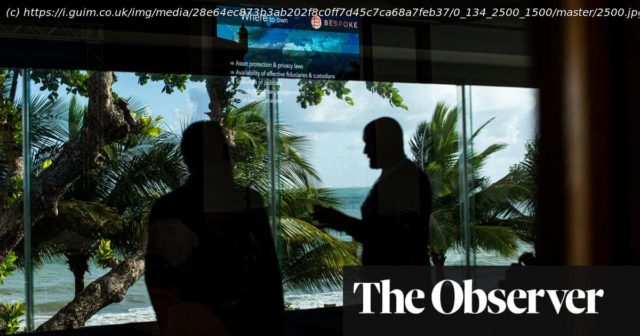Array
On a humid December evening in Puerto Rico, more than 100 cryptocurrency and blockchain aficionados gathered at a mansion within a gated, jungle-like enclave of San Juan. A local band played softly while waiters served hors d’oeuvres to attendees who paid as much as $3,000 to attend CoinAgenda Caribbean, a three-day conference promising a VIP experience of networking opportunities and fireside chats about the future of the industry.
The crypto crowd arrived in chartered buses to the party, where they sipped on cocktails from an open bar around a pristine white pool, frogs singing in the trees surrounding the property owned by Michael Terpin, founder of CoinAgenda. A private chef from Lyon, France, provided a five-course meal – a fusion of French dishes and Puerto Rican staples like a pig roast and rice and beans.
Conversation meandered through typical talking points – new token launches, an app for ordering private jets, and musings on what it’s like to relocate to Puerto Rico, home to one of the world’s most active crypto communities thanks to tax-friendly incentives. But one topic seemed far from everyone’s mind: FTX, the crypto exchange that spectacularly collapsed in November, and its now jailed founder Sam Bankman-Fried, who in the last few weeks alone lost his company, was arrested in the Bahamas on charges of fraud and money laundering, and sparked perhaps the greatest reckoning yet over the industry’s survival.
From the beaches of Puerto Rico, the “crypto winter” is looking balmy. While lawmakers and industry analysts say the FTX debacle has exposed serious flaws at the heart of crypto’s promise, many here aren’t giving up.
In fact, they’re doubling down.
“People who have been around awhile realize that there are cycles,” said Terpin. “We have more volatility than the stock market because we are a younger space – but if you’re an experienced investor, you’re not worried.”
The CoinAgenda Caribbean conference took place as part of the second annual Puerto Rico Blockchain Week, a five-day series of events exploring blockchain technology, crypto, and its impact on the island. Throughout the week, FTX seemed to be an afterthought – mentioned only sparingly in the hours of panels and discussions.
One crypto entrepreneur sheepishly admitted he had lost $70,000 in the FTX collapse, but said he planned to continue with business as usual. Another said she worked in real estate on the island and had several clients seeking to sell their homes to finance more crypto purchases while prices are low. Others argued that the FTX scandal would ultimately be positive for the industry, weeding out fraud and creating more legitimacy.
Terpin acknowledged that attendance at CoinAgenda was slightly down this year, as is common when bitcoin’s price falls – but said that at times like these, there was “higher quality attendance”. Terpin says he came to the island in 2016 on the precipice of a continuing influx of crypto entrepreneurs fueled by generous tax breaks on capital gains. In the years since, the community has grown exponentially, with hundreds of newcomers taking advantage of the laws.
As the dinner party drew to a close, he raised a toast to the growing blockchain community, citing the success of Pantera, a crypto firm founded by the former Goldman Sachs bond trader Dan Morehead that has operations on the island and raised $1.6bn this year.
“They say we aren’t bringing money to Puerto Rico – how about $1.6bn?” Terpin said, alluding to a longstanding criticism: that wealthy outsiders are having a negative effect on Puerto Ricans by driving up living costs, and that local entrepreneurs have not benefited equally from the crypto boom.
“The best thing that could happen is that the crash makes them leave,” said Marina Reyes Franco, an art curator whose recent projects center on the cultural impact of the “visitor economy” on the island. She said that, although she had grown up in San Juan, she had struggled to find affordable housing in recent years. “At the end of the day, this is about a new era of colonialism and laws that only benefit the elite.
Home
United States
USA — IT In balmy Puerto Rico, diehards shrug off the crypto winter: ‘We’re not...






